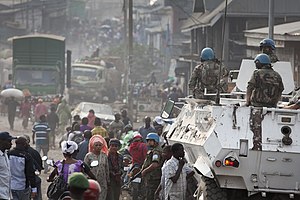
Back تمرد 23 مارس Arabic Conflicte de l'est del Congo del 2012 Catalan Conflicto del este del Congo de 2012-2013 Spanish M23ren matxinada Basque Rébellion du M23 French Konflikten i Øst-Kongo i 2012 NB Rebelia M23 w Demokratycznej Republice Konga Polish Rebelião no leste da República Democrática do Congo em 2012-2013 Portuguese Конфликт в Киву (2012—2013) Russian Конфлікт у Північному Ківу Ukrainian
| M23 rebellion | |||||||
|---|---|---|---|---|---|---|---|
| Part of the Kivu conflict | |||||||
 UN forces and refugees in Goma during the rebellion | |||||||
| |||||||
| Belligerents | |||||||
|
March 23 Movement | |||||||
| Commanders and leaders | |||||||
|
|
Bertrand Bisimwa Sultani Makenga (POW)[7] Bosco Ntaganda (POW)[8][9][10] | ||||||
| Strength | |||||||
|
| 6,000 men (2012)[11] | ||||||
| Casualties and losses | |||||||
| 962 killed[12] | |||||||
|
Civilian casualties: 283+ killed[12] 140,000 displaced.[15] | |||||||
The M23 rebellion was an armed conflict in North Kivu, Democratic Republic of the Congo (DRC), that occurred between the March 23 Movement and government forces between 4 April 2012 and 7 November 2013. It ended when a peace agreement was made among eleven African nations, and the M23 troops surrendered in Uganda. The rebellion was part of continued fighting in the region after the formal end of the Second Congo War in 2003. The conflict reignited in late 2021 after rebel "general" Sultani Makenga and 100 rebel fighters attacked the border town of Bunagana but failed. A few months later, with a much larger force, the rebels of the M23 movement renewed their attack and captured Bunagana.
In April 2012, former National Congress for the Defence of the People (CNDP) soldiers mutinied against the DRC government and the peacekeeping contingent of the United Nations Organization Stabilization Mission in the Democratic Republic of the Congo (MONUSCO). Mutineers formed a rebel group called the March 23 Movement (M23), also known as the Congolese Revolutionary Army. It was composed of former members of the rebel CNDP, and allegedly sponsored by the government of the neighbouring states of Rwanda and Uganda.
On 20 November 2012, M23 rebels took control of Goma, a North Kivu provincial capital with a population of one million people.[16] By the end of November that year, the conflict had forced more than 140,000 people to flee their homes, according to the U.N. refugee agency, in addition to the refugees already forced from their homes by previous rounds of fighting in the region.[17] After repelling an ill-organized government counterattack and making some further gains, M23 agreed to withdraw from Goma on their own and left the city in early December.
On 24 February 2013, eleven African nations signed an agreement designed to bring peace to the region. In October 2013, Congo told the UN that the M23 movement was virtually finished after being pushed back to a small area near Rwanda. On 7 November 2013, following significant defeats to a UN-backed government offensive, M23 troops crossed into Uganda and surrendered.
- ^ a b Cite error: The named reference
africareview.comwas invoked but never defined (see the help page). - ^ a b Cite error: The named reference
un.orgwas invoked but never defined (see the help page). - ^ "UN troops clash with rebels in DR Congo – Africa". Al Jazeera English. Archived from the original on 27 August 2013. Retrieved 4 November 2013.
- ^ a b According to a leaked U.N. report. "Rwanda defence chief leads DR Congo rebels, UN report says". BBC. 17 October 2012. Archived from the original on 27 November 2012. Retrieved 17 October 2012.
- ^ Andrew Harding (5 November 2013). "BBC News – DR Congo M23 rebels 'end insurgency'". BBC. Archived from the original on 6 November 2013. Retrieved 6 November 2013.
- ^ a b c Olivier, Darren. "How M23 was rolled back". African Defence Review. Archived from the original on 3 April 2015. Retrieved 21 April 2015.
- ^ "DR Congo: M23's Makenga and Runiga factions 'clash'". BBC News. 25 February 2013. Archived from the original on 28 February 2013. Retrieved 3 March 2013.
- ^ "DR Congo troops shell rebel bases". Al Jazeera. 18 May 2012. Archived from the original on 6 September 2012. Retrieved 20 November 2012.
- ^ Smith, David (28 November 2012). "Hunting the Terminator: Congo continues search for Bosco Ntaganda". The Guardian. London. Archived from the original on 11 August 2014. Retrieved 4 November 2013.
- ^ Mike Corder (22 March 2013). "International court detains Rwandan-born warlord". Usatoday.com. Archived from the original on 15 April 2014. Retrieved 4 November 2013.
- ^ As of 1 December 2012, see Johnny McDevitt (1 December 2012). "Congo rebels withdraw from Goma". The Guardian. London. Archived from the original on 31 October 2013. Retrieved 4 November 2013.
- ^ a b c d Estimate for 2013 only presented by Casey-Maslen, Stuart, ed. (2014). The War Report: Armed Conflict in 2013. Oxford: Oxford University Press. pp. 135–6.
- ^ a b "Casualties as Congo and UN forces fight rebels – Yahoo News". News.yahoo.com. 26 August 2013. Archived from the original on 5 November 2013. Retrieved 4 November 2013.
- ^ BDlive – SA soldiers getting more involved in Congo Archived 30 December 2013 at the Wayback Machine, retrieved 29 December 2013
- ^ Casey-Maslen, Stuart, ed. (2013). The War Report: Armed Conflict in 2012. Oxford: Oxford University Press. p. 107.
- ^ "Goma: M23 rebels capture DR Congo city". BBC News. 20 November 2012. Archived from the original on 5 December 2012. Retrieved 18 November 2012.
- ^ Laura Smith-Spark and David McKenzie (30 November 2012). "UK withholds Rwanda aid over claims it backs Congo rebels". CNN. Archived from the original on 20 August 2013. Retrieved 1 December 2012.
© MMXXIII Rich X Search. We shall prevail. All rights reserved. Rich X Search